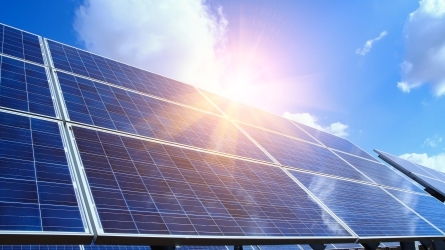
Energy management for collective self-consumption of photovoltaic energy
Esta actividad abierta y gratuita se enmarca en el Curso de Verano "Una universidad que mira al mar: navegando por el conocimiento en el buque escuela Saltillo"
Description
Lecture on collective self-consumption of photovoltaic energy with dynamic distribution at the Izarbel Science Park.
A summary of the lecture in which the topic to be addressed in several paragraphs (Approximately 3000 characters, including spaces).
This lecture aims to explain the development of efficient systems of efficient energy exchange management systems for collective self-consumption photovoltaic installations, thanks to technologies such as Blockchain and Internet of Things. One of the pilot actions carried out at the Izarbel Science Park in Bidart will be explained. This collective self-consumption demonstrator involves three Izarbel buildings, but all the photovoltaic production comes from one of them, although the consumption of this production is shared between the three buildings.
In order to do that, some devices have been installed, they are connected to the three smart consumption meters of these buildings and to the production meter. These devices allow the data to be retrieved and communicated via the network, using the data from the power extracted and injected to test the three possible types of distribution:
1. Static: the distribution coefficients are fixed.
2. Dynamic: the distribution is carried out according to rules established by the organising entity of the self-consumption collective.
3. Dynamic by default: the distribution is variable and is calculated automatically in proportion to the consumption of each participant.
To maximise the self-consumption rate, and minimise consume as far as possible, an energy management system has been designed and developed. It acts 1) on the heating, ventilation and air conditioning systems, adapting the temperature adjustments of the rooms in the building, and 2) on the behaviour of the building’s users which influences in the electricity consumption related to lighting, charging of mobile phones and laptops, etc. In addition, prediction models for consumption and photovoltaic production have been developed and validated. These models will be used to optimise the self-consumption rate and energetic efficiency.
Activity directed to
- All public
Contributors
Program
15-07-2022
Registro / Erregistroa
“Energia fotoboltaikoaren kudeaketa“
- Haritza Camblong | UPV/EHU - Profesor Titular de Universidad en la Escuela de Ingeniería de Gipuzko
- Garazi Etxegarai Azkarategi | UPV/EHU - Doctoranda en la Escuela de Ingeniería de Gipuzkoa (Donostia), en el departamento de Ingeniería de Sistemas y Automática
Speakers

Haritza Camblong
Profesor Titular de Universidad en la Escuela de Ingeniería de Gipuzkoa (Donostia), en el departamento de Ingeniería de Sistemas y Automática. Coordinador del Máster de Control en Redes Eléctricas Inteligentes y Generación Distribuida
Haritza Camblong nació en Baiona, País Vasco, el 31 de enero de 1972. Recibió el título de "Maitrise de Physique" en la UPPA de Pau, Francia, en 1994, el Diploma de Licenciado en Ingeniería Eléctrica por la ENSIEG de Grenoble, Francia, en 1996, y el Doctorado en Automática en el ENSAM de Burdeos y la Universidad de Mondragón en 2003. Después de graduarse en 1996, trabajó en Ikerlan, el centro de investigación del grupo industrial MCC, en Mondragón, durante dos años en aplicaciones de mecatrónica. Más tarde, trabajó en la cooperativa MSI, en Andoain, durante otros dos años. En 2001, se incorporó como profesor a la escuela de ingeniería ESTIA en Bidart, donde creó el grupo de investigación EneR-GEA. Desde noviembre de 2008, es miembro de la Universidad del País Vasco (UPV/EHU), donde actualmente trabaja en el Departamento de Ingeniería de Sistemas y Automática, y en el grupo de investigación SI + E en Donostia-San Sebastián. Es el coordinador del Máster en "Control en redes eléctricas inteligentes y generación distribuida". Las asignaturas que da actualmente son: “Automatización y Control” y “Modelado y Control de Aerogeneradores”.

Garazi Etxegarai Azkarategi
Doctoranda en la Escuela de Ingeniería de Gipuzkoa (Donostia), en el departamento de Ingeniería de Sistemas y Automática.
Garazi Etxegarai graduated in Renewable Energy Engineering from the UPV/EHU in 2019 and subsequently studied a Master’s Degree in Smart Grid Control and Distributed Generation, also at the UPV/EHU. After finishing a project on the prediction on photovoltaic generation based on artificial intelligence at Ceit, she started working as a researcher at the UPV/EHU in the framework of the EKATE project. She is currently working on her thesis also at UPV/EHU, partially financed by the Gipuzkoa Provincial Council through a research and innovation project on circular economy, energy sustainability and climate change in 2022. Her current research interests cover energy management, including the prediction of electricity production and consumption using artificial intelligence techniques
Venue
Miramar Palace
Pº de Miraconcha nº 48. Donostia / San Sebastián
Gipuzkoa
Miramar Palace
Pº de Miraconcha nº 48. Donostia / San Sebastián
Gipuzkoa





